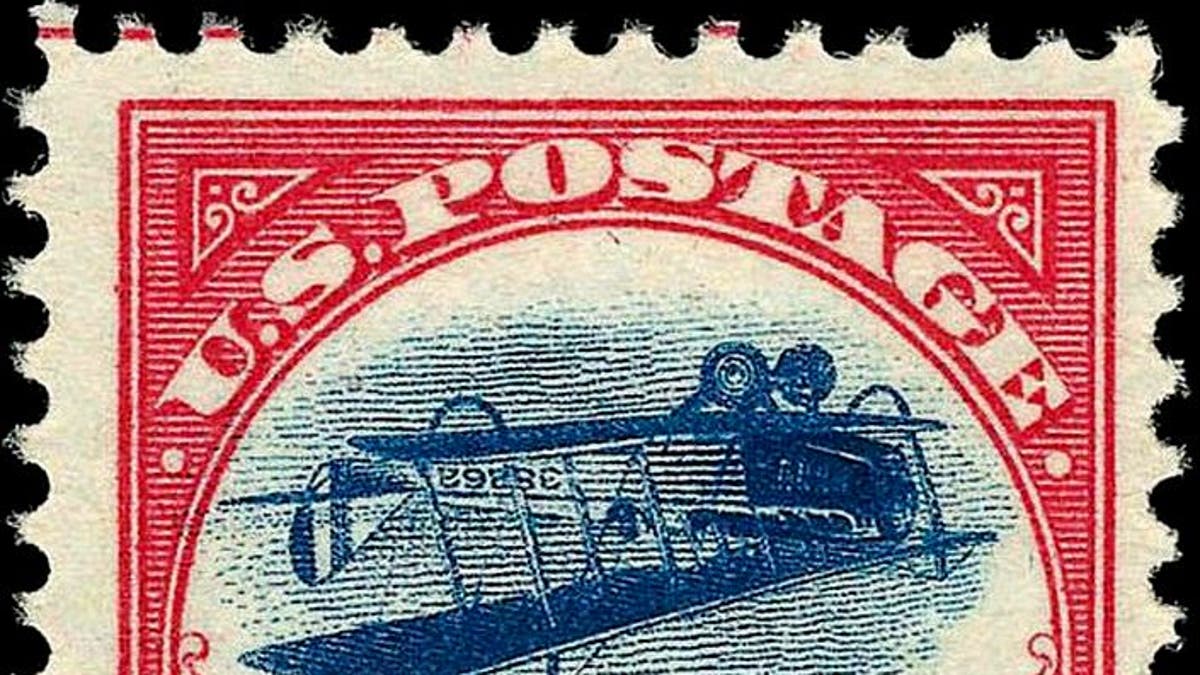
Donald Sundman, president of New York’s Mystic Stamp Company, says he will pony up $50,000 apiece for the stolen stamps that feature an upside-down Curtiss JN-4 biplane.
NEW YORK – A rare 1918 U.S. postage stamp featuring an upside-down plane that was stolen six decades ago and ended up in Northern Ireland was returned to its American owner on Thursday.
But the mystery surrounding the Inverted Jenny remains: Who stole it and three other such stamps at a 1955 convention in Virginia?
On Thursday at the World Stamp Show, the young man from Northern Ireland who inherited America's most famous stamp from his grandfather watched as it was handed to the Bellefonte, Pennsylvania-based American Philatelic Research Library, which holds the rights to the four. Two of the other stamps were recovered years ago, and the fourth is missing.
U.S. Attorney Preet Bharara, who was an avid stamp collector as a boy, helped set up the legal restitution process.
"It's particularly great to have this accident of timing, the resurfacing of one of the world's most famous stamps just in time for one of the world's rarest events, the World Stamp Show," Bharara said at the Jacob K. Javits Convention Center, the show venue.
A hundred Inverted Jenny stamps were printed in 1918, until someone noticed the error. The misprint comes from a design that marked the launch of U.S. air mail, featuring a Curtiss JN-4H biplane, nicknamed the Jenny.
The upside-down, century-old aircraft made those stamps much more valuable and intriguing, with counterfeits created as the collection was scattered. With a postage of 24 cents, one stamp from the batch of 100 was auctioned for $1.3 million this week in New York.
Keelin O'Neill inherited his stamp several years ago from his grandfather, who stashed it away in a box alongside old records and an antique clock.
"I had no idea about the history and importance of the stamp until very recently," he said. "I have to say, it's quite fascinating, and I'm excited to learn more."
This past April, he approached auction house Spink USA for an appraisal. Spink turned to the Philatelic Foundation and outside experts to make sure this was one of the genuine missing Inverted Jennys. The foundation contacted the FBI, which opened a criminal case.
A wealthy collector, Ethel B. Stewart McCoy, had bought the four-stamp block in 1936 and allowed the American Philatelic Society to exhibit them at the 1955 collectors' convention in Norfolk, Virginia. The stamps disappeared from a display case there, and it's been a whodunit ever since. Two were recovered in 1977 and 1982 from Chicago connoisseurs who had bought them.
On Thursday, O'Neill accepted a check for $50,000 as his reward, just after the head of the FBI's New York field office, Diego Rodriguez, handed over the Jenny to the American Philatelic Research Library's president, Roger Brody.
Roaring applause followed for the tiny, unobtrusive stamp sitting under a clear, plastic cover, it's value unknown.
But one thing is certain, said the American Philatelic Society's executive director, Scott English: "I know this case is far from over, and I know our friends in the philatelic world will work very hard to see if they can solve the rest of the mystery."





















